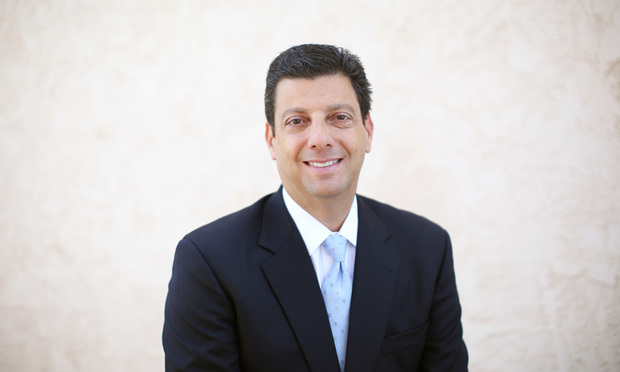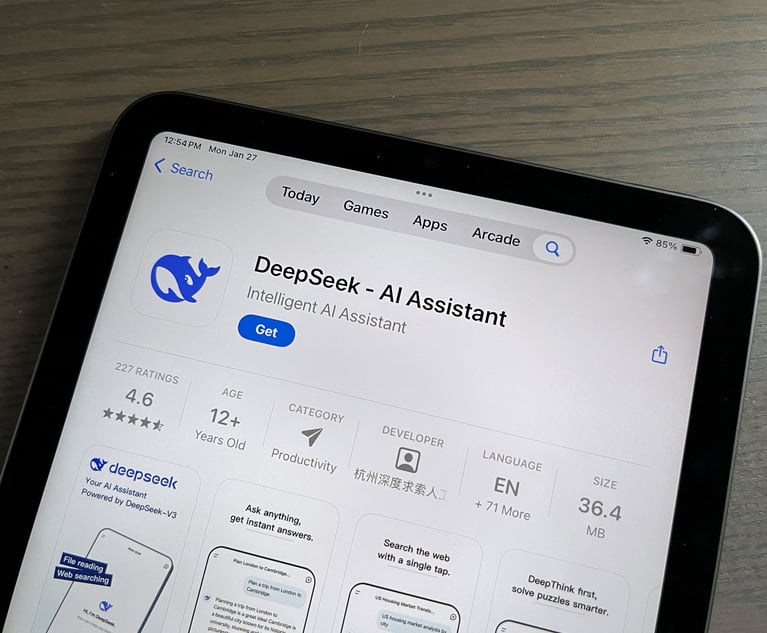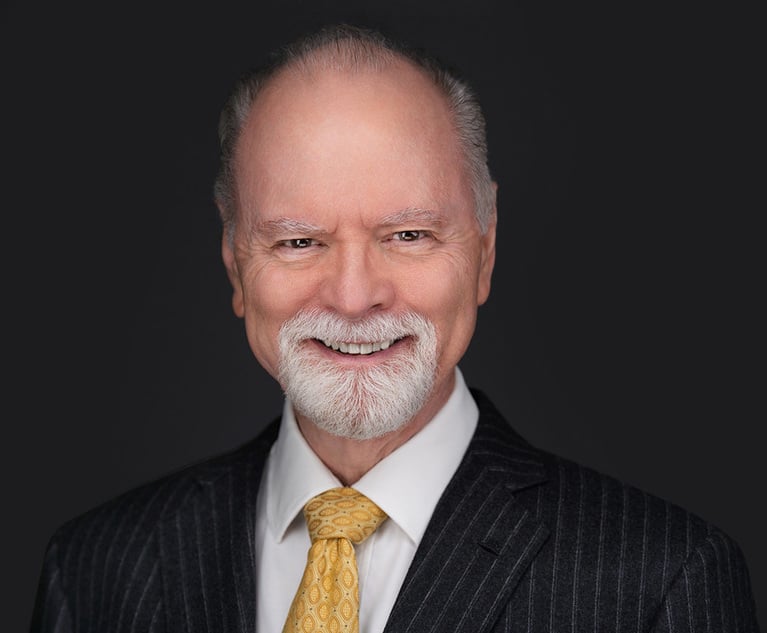5 Keys for Modern Law Firm Management
Over the years, my partner Bob Tyson and I have discovered several key management techniques that have helped us build a successful, growth-sustaining law firm in the modern, millennial-driven age.
August 27, 2018 at 12:52 PM
6 minute read
 Patrick Mendes, founding partner of Tyson & Mendes.
Patrick Mendes, founding partner of Tyson & Mendes.
Law firms traditionally get a bad rap for overworking and underappreciating employees. Recognizing this reputation is particularly important at a time when the youngest members of the workforce seek employers who help them experience personal fulfillment by feeling they are making a difference in the world.
As the American Bar Association predicts, roughly half of the U.S. workplace will be made up of millennials by 2020. As foreboding as this might seem to some—law firms large and small must find new ways to attract and retain younger attorneys if they wish to thrive in today's environment.
Over the years, my partner Bob Tyson and I have discovered—both on our own, and through the experiences of other large firms—several key management techniques that have helped us build a successful, growth-sustaining law firm in the modern, millennial-driven age.
Transparency
Looking back on my first few years as an attorney, associates often relied on rumors and tidbits of information to learn what was going on within a firm. Rumors of financial troubles or inaccurate information about criteria for partnership often drove the professional decisions attorneys made—without any firmwide communication dispelling those rumors.
Modern firms should be transparent firms. Young attorneys want to know how the firm operates and makes money—so tell them. Share revenue figures, expenses, client breakdowns, average billable hours and the firm's future growth plans.
To do this, Tyson & Mendes holds an annual “State of the Firm” meeting in which the managing partner shares statistics such as case receipts, and revenue, as well as plans for the coming year. The firm also holds biweekly “Bagels With Bob” (clearly, I was not consulted on the name!), where attorneys throughout the firm's eight nationwide offices discuss specific legal issues, firm news and war stories with the managing partner.
Being informed of firm wins, challenges, future plans and goals gives employees the feeling of working toward something bigger than themselves and, we believe, makes them feel more personally invested in the firm's success.
Participation
Hand-in-hand with transparency is participation. Young attorneys want to be involved in the growth and development of the firm. Because growing firms often face new challenges, encouraging participation in the process of addressing these challenges allows attorneys to take ownership in the solution. What is more, younger attorneys often find a more efficient and technologically savvy approach to address a problem. In the modern, digital age—this kind of participation is a must.
Beyond internal problem-solving, modern firms should create opportunities for attorneys to innovate, proactively address emerging legal challenges and connect with the world around them in a collaborative setting. We encourage our attorneys to keep up-to-date on news, politics and developments that may impact the legal landscape. As a result, our attorneys are empowered to develop new specialties and skills, equipping themselves to tackle new challenges facing our clients.
Firms should also work to bridge the gap between junior and senior attorneys by providing mentorship programs, fostering a collaborative atmosphere and employing a team structure. For example, we convene task forces and committees driven to addressing current firm needs or industry developments, which has led to new practice areas, training programs and operating procedures. By involving our attorneys' talent and ideas in the process of sustainably growing the firm, we find our employees to be more invested in the success and direction of our growth.
Diversity
It is common knowledge that companies—regardless of industry or size—benefit from a diverse workforce. Moreover, attorneys often will choose to work for a firm that celebrates diversity over one that does not. Simply put, a diverse workforce is a better workforce.
At Tyson & Mendes, this means employing the best legal talent that is also representative of the community as a whole. The firm has made diversity a priority, and in addition to sponsoring a firmwide women's initiative and young professionals group, it is above the national average in representation for women.
Structured Growth
Sustainable growth does not happen overnight or without long-term planning. Law firms seeking to prioritize growth must have a plan and the structure in place to achieve that growth. And, frankly, most lawyers are not business people. Therefore, consulting an organizational expert may be necessary to create and implement a strategic growth plan, then regularly assess strengths, weaknesses, opportunities and threats in all departments of the firm.
A firm's growth can also be spurred by the professional growth of its attorneys. Formalized training processes, “Team Leader in Training” programs, partner meetings, team leader meetings and strategic planning committees are all ways to encourage professional development within the firm.
For example, Tyson & Mendes employs a firmwide program that trains all attorneys to use a unique set of proven defense methods to deliver consistently successful results for every member of the team. The firm also offers clearly defined partnership criteria, so all attorneys—regardless of experience level or tenure—can set themselves down a path for success.
Culture
A firm cannot grow if it cannot retain its attorneys. Plus, litigation can be stressful! Modern firms must create a company culture that focuses on excellence while also providing a supportive work environment. This can be accomplished in a number of ways, such as hosting regular social events to give employees the chance to bond outside of the office, while also taking the edge off of the high-stakes work performed every day. Each year, the Tyson & Mendes San Diego office celebrates the start of summer—and the end of its annual fitness challenge—with a beach party. It is one of our most highly anticipated events of the year.
Or, consider building a charitable giving program that gives employees the opportunity to express themselves and spend time working toward causes they champion. For our attorneys, these opportunities help provide breaks from what can be a singular focus of law practice, and makes them feel more fulfilled in their work and as an employee of the firm.
When it comes to growing a law firm, obviously, one size does not fit all. However, we have found using these modern management techniques helps remove the “mysteries” often associated with the business aspects of a law firm and eliminates the impediments to success for young attorneys. As our attorneys grow and succeed, so too does the firm.
Patrick Mendes is a founding partner of Tyson & Mendes, one of the country's fastest growing defense law firms that represents corporations, insurance companies and their business clients in all matters of civil litigation.
This content has been archived. It is available through our partners, LexisNexis® and Bloomberg Law.
To view this content, please continue to their sites.
Not a Lexis Subscriber?
Subscribe Now
Not a Bloomberg Law Subscriber?
Subscribe Now
NOT FOR REPRINT
© 2025 ALM Global, LLC, All Rights Reserved. Request academic re-use from www.copyright.com. All other uses, submit a request to [email protected]. For more information visit Asset & Logo Licensing.
You Might Like
View All
The Time Is Now for Employers to Assess Risk of Employees’ Use of DeepSeek
4 minute read
Loopholes, DNA Collection and Tech: Does Your Consent as a User of a Genealogy Website Override Another Person’s Fourth Amendment Right?

Trending Stories
- 1Lack of Jurisdiction Dooms Child Sex Abuse Claim Against Archdiocese of Philadelphia, says NJ Supreme Court
- 2DC Lawsuits Seek to Prevent Mass Firings and Public Naming of FBI Agents
- 3Growth of California Firms Exceeded Expectations, Survey of Managing Partners Says
- 4Blank Rome Adds Life Sciences Trio From Reed Smith
- 5Divided State Supreme Court Clears the Way for Child Sexual Abuse Cases Against Church, Schools
Who Got The Work
J. Brugh Lower of Gibbons has entered an appearance for industrial equipment supplier Devco Corporation in a pending trademark infringement lawsuit. The suit, accusing the defendant of selling knock-off Graco products, was filed Dec. 18 in New Jersey District Court by Rivkin Radler on behalf of Graco Inc. and Graco Minnesota. The case, assigned to U.S. District Judge Zahid N. Quraishi, is 3:24-cv-11294, Graco Inc. et al v. Devco Corporation.
Who Got The Work
Rebecca Maller-Stein and Kent A. Yalowitz of Arnold & Porter Kaye Scholer have entered their appearances for Hanaco Venture Capital and its executives, Lior Prosor and David Frankel, in a pending securities lawsuit. The action, filed on Dec. 24 in New York Southern District Court by Zell, Aron & Co. on behalf of Goldeneye Advisors, accuses the defendants of negligently and fraudulently managing the plaintiff's $1 million investment. The case, assigned to U.S. District Judge Vernon S. Broderick, is 1:24-cv-09918, Goldeneye Advisors, LLC v. Hanaco Venture Capital, Ltd. et al.
Who Got The Work
Attorneys from A&O Shearman has stepped in as defense counsel for Toronto-Dominion Bank and other defendants in a pending securities class action. The suit, filed Dec. 11 in New York Southern District Court by Bleichmar Fonti & Auld, accuses the defendants of concealing the bank's 'pervasive' deficiencies in regards to its compliance with the Bank Secrecy Act and the quality of its anti-money laundering controls. The case, assigned to U.S. District Judge Arun Subramanian, is 1:24-cv-09445, Gonzalez v. The Toronto-Dominion Bank et al.
Who Got The Work
Crown Castle International, a Pennsylvania company providing shared communications infrastructure, has turned to Luke D. Wolf of Gordon Rees Scully Mansukhani to fend off a pending breach-of-contract lawsuit. The court action, filed Nov. 25 in Michigan Eastern District Court by Hooper Hathaway PC on behalf of The Town Residences LLC, accuses Crown Castle of failing to transfer approximately $30,000 in utility payments from T-Mobile in breach of a roof-top lease and assignment agreement. The case, assigned to U.S. District Judge Susan K. Declercq, is 2:24-cv-13131, The Town Residences LLC v. T-Mobile US, Inc. et al.
Who Got The Work
Wilfred P. Coronato and Daniel M. Schwartz of McCarter & English have stepped in as defense counsel to Electrolux Home Products Inc. in a pending product liability lawsuit. The court action, filed Nov. 26 in New York Eastern District Court by Poulos Lopiccolo PC and Nagel Rice LLP on behalf of David Stern, alleges that the defendant's refrigerators’ drawers and shelving repeatedly break and fall apart within months after purchase. The case, assigned to U.S. District Judge Joan M. Azrack, is 2:24-cv-08204, Stern v. Electrolux Home Products, Inc.
Featured Firms
Law Offices of Gary Martin Hays & Associates, P.C.
(470) 294-1674
Law Offices of Mark E. Salomone
(857) 444-6468
Smith & Hassler
(713) 739-1250







